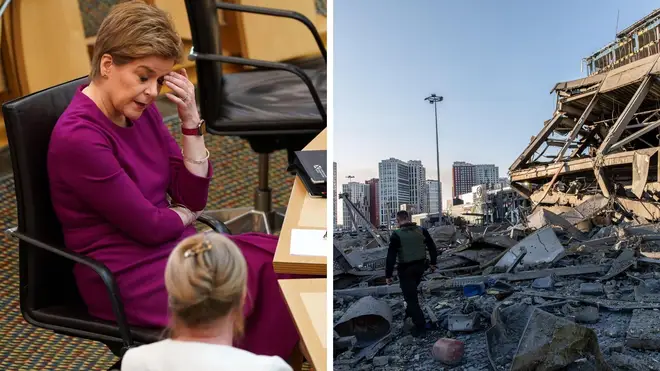
Iain Dale 10am - 1pm
24 March 2022, 15:19 | Updated: 24 March 2022, 18:09

Nicola Sturgeon has been accused of making an "unacceptable and tasteless" link between the war in Ukraine and her desire for Scottish independence in a row echoing the fury sparked when Boris Johnson compared the conflict to the Brexit vote.
Writing in the New Statesman, Scotland's First Minister said the invasion of Ukraine by Russia was a "standing threat to the values embodied by liberal democracies everywhere" and that it was time "to stand up for, and demonstrate, the power of vital, robust democracies."
She goes on to argue that the importance of democracy means that Scotland must become independent.
Her article comes just days after another SNP MSP said that stopping discussions on a second constitutional vote because the focus of governments are on Ukraine, would be "grist to the Kremlin’s mill".
Read more: P&O Ferries boss admits firm 'chose' to break the law by sacking 800 workers
Scottish Conservative constitution spokesman, Donald Cameron MSP, said: “It is unacceptable and tasteless for the First Minister to make any sort of link between the war in Ukraine and Scottish independence.
“It appears there is no issue that is beyond Nicola Sturgeon when it comes to pushing her endless obsession with breaking up the United Kingdom.
“It is astonishing that pushing the case for another referendum was at the forefront of the First Minister’s mind when writing about the truly horrendous situation in Ukraine.
"The language used here by Nicola Sturgeon is wholly inappropriate and she needs to urgently apologise for this piece, given the continued tragic humanitarian crisis that is unfolding in Ukraine.”
However a spokesperson for the First Minister rejected the claim robustly.
“The First Minister made no such link whatsoever – any suggestion she has is a flat-out lie.”
In her article Nicola Sturgeon writes: "We must assert – and, more importantly, we must show – that strong national-democratic institutions are crucial building blocks of prosperity and fairness.
"In the UK, that means addressing the deep-rooted issues of poverty, inequality and lack of opportunity that have been allowed to fester for far too long."
Going on to criticise the UK Conservative government for the cost of living crisis she says the Scottish Government has limited powers to tackle soaring prices and bills.
As a result, she says, "we are determined to achieve independence for Scotland by offering the choice of a better, fairer future."
She adds: "This is in line with the democratic mandate we secured at last year’s Scottish parliament election, in which the SNP won the highest share of the vote of any party in the history of devolution."
"Scotland will, we intend, take its place as a member state in its own right of both the European Union and Nato.
"And our European partners know, now more than ever, that they can depend on an independent Scotland as a beacon of peace and democracy, as together we face the greatest challenge posed to those principles since 1945."
Scottish Labour's deputy leader Jackie Baillie described the First Minister's article as "unthinkably crass"
She added: “We have already seen Boris Johnson likening Ukraine’s struggle for freedom to Brexit, and now Nicola Sturgeon is doing the same thing with Scottish independence.
“The SNP and the Tories have both let their constitutional obsessions warp their worldview and destroy their sense of perspective.
“The First Minister must apologise for this unacceptable attempt to use the ongoing crisis in Ukraine to bolster her own separatist agenda.
“Our first and only priority in this war must be standing in solidarity with the people of Ukraine in defence of democracy and international law.”
On Saturday Boris Johnson sparked fury after comparing the Ukraine conflict to Brexit in a speech to a spring conference of the Tory party in Blackpool.
He said Britons, like Ukrainians, had the instinct "to choose freedom" and cited the 2016 vote to leave the EU as a "recent example".
The comments caused widespread anger among politicians both in the UK and Europe.